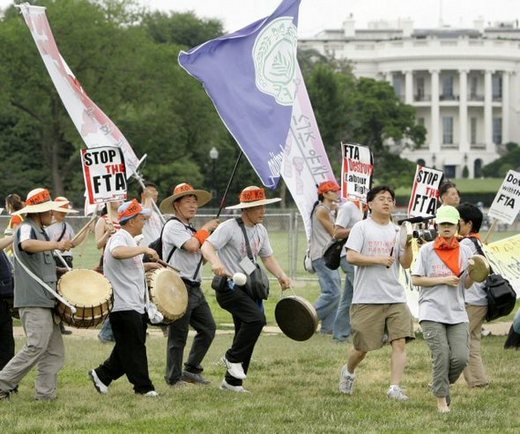Breaking off FTA discussions always an option
The Hankyoreh | Seoul | 5 June 2006
Editorial
Breaking off FTA discussions always an option

Korea’s team of negotiators for the proposed free trade agreement (FTA) with the United States left for Washington on Sunday amid much concern. Depending on how the discussions go, there could be a lot of controversy and even deeper discord between interests. The negotiators have a heavy burden on their shoulders. If they continue to position South Korea in an inferior manner, in the way Korea has already "humiliatingly" accepted conditions that include the reduction of the screen quota before it has even sat down at the negotiating table, then the negotiators will be sealing their own fate.
Portions of the American draft proposal have been revealed in the media, sending a wake-up call to those who had been previously optimistic, and giving those who were not reason for even more concern. Korea does not yet even have its new financial services in place, but the U.S. wants that sector to receive the same treatment as domestic institutions; you can see that what the U.S. is after is an open financial market. It is pursuing a wide range of goals in taxation, legislation, and the public sector, including the reorganization of automobile taxes and new programs for labor and the environment. It says it wants agriculture and textiles to be given special importance, with separate clauses in the agreement. Even within the South Korean government, there is concern that the official prices paid for pharmaceuticals by health insurance programs could be upset if the American proposal is accepted. Initial draft proposals are always going to take an aggressive stance, but the intensity this time is even greater than expected.
Top Korean negotiator Kim Jong-hoon says that during the first round of negotiations he intents to "work to create a proposal that is a balanced one, acceptable to both sides." The reason that these words are not reassuring is because the government has not given the country reason to believe what it says. Merely signing an agreement seems to have become a goal in and of itself, so the country is left to wonder if the team will be able to negotiate as equals with the U.S., the world’s only superpower.
Bringing up the various indicators and debating what is to be gained and what is to be lost would only lead to more controversy. What feels more relevant is the experience of Mexico, which has an FTA with the U.S., and the observations of one of the country’s senior economists when he says it would be dangerous and damage maneuverability in the international community for a country surrounded by major powers to integrate itself with one superpower through a comprehensive agreement.
Korea should not have entered these negotiations so hastily, but that does not mean there are not options. We do not see these negotiations as a single path that must be hastily followed until the end. Negotiators need to make it clear to the U.S. what Korea’s position is, and they need to be firm and ready to get up and leave the negotiations if there is not a meeting of minds. Things can always go slowly if the U.S. chooses to not accept what is proposed. First impressions mean a lot at the first round of discussions. If Korea starts to let itself get dragged around, it will be hard to ever find its way. The government also needs to have measures in place that can minimize the aftereffects should there be a breakdown in the negotiations.





